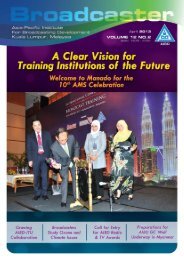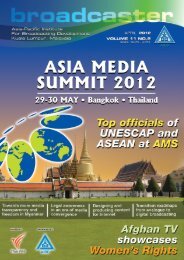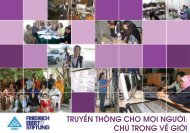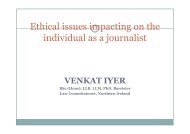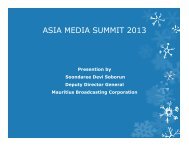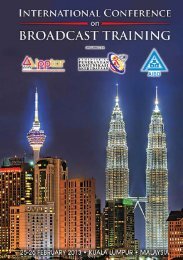SUMMIT
New Visions Asia Media Summit 2008 - AIBD
New Visions Asia Media Summit 2008 - AIBD
- No tags were found...
Create successful ePaper yourself
Turn your PDF publications into a flip-book with our unique Google optimized e-Paper software.
Most people use convergence to refer only to the technological process, which brings<br />
together – and makes possible – these mulple media plaorms. But convergence also<br />
represents a cultural shi as consumers are encouraged to seek out new informaon and<br />
– more importantly – to make connecons. We are changing the way we think and<br />
interact.<br />
That’s where parcipatory culture comes in – a stark contrast to the passive way most of<br />
us learned to consume media – watching the TV or listening to radio, with no way of<br />
talking back. Now rather than saying media producers and consumers occupy separate<br />
roles, we are starng to see them as parcipants who interact with each other according<br />
to a new set of rules we are all just defining.<br />
Convergence occurs within the brains of individual consumers and through their social<br />
interacons with others. Each of us finds our meaning and creates our interpretaons and<br />
personal myths from the informaon we consume. But none of us can know everything<br />
about any given topic, so there is added incenve for us to talk about the media we<br />
consume. Yes, we may fragment and there will be niche markets, but that is why talking to<br />
others becomes more important. This conversaon creates buzz that is increasingly<br />
valued by the media industry.<br />
That is our collecve intelligence. None of us can know everything; each of us knows<br />
something; and we can put the pieces together if we pool our resources and combine our<br />
skills. A great example is Wikipedia – which is really the product of collecve intelligence<br />
on the web. Or the Survivors spoilers…<br />
So how can this – convergence, parcipatory culture and collecve intelligence - change<br />
polics? Well, in the Philippines, as early as 2004, surveys showed that 90% of Filipinos get<br />
their informaon from television. That was part of the reason I wanted to come home:<br />
given our polical situaon and the unfulfilled promise of our democracy, I thought television<br />
journalists could take an acve role in naon building using the power inherent in our<br />
medium.<br />
Add to this the internet, which is changing polics all around the world. In the 2004<br />
elecons in the US, a presidenal candidate Howard Dean used the internet to raise<br />
campaign funds, to call for support, to trigger rallies, to create a more inmate relaonship<br />
with his supporters through blogging. For the 2007 elecons, look at the difference in<br />
the way Hillary Clinton and Barack Obama are running their internet campaigns. Obama’s<br />
website has become a cult hit, and the results are financially tangible for him. In February,<br />
he raised $55 million - $45 million came from the internet. Here in Malaysia, the internet<br />
played a crucial role in the past elecons – forcing mainstream media groups to go<br />
through major soul-searching.<br />
Tradional broadcast – or old media send out a mass message, but new media now give<br />
viewers the chance to answer back. That is user-generated content … also known as cizen<br />
journalism. Gone are the days of tradional gatekeepers, partly because of a clamor to<br />
provide non-mainstream views free of corporate and polical vested interests.<br />
It started in the US aer the 1988 US presidenal elecons – a reacon to the loss of trust<br />
in the news media and the polical process. A decade later, acvists in Seale – disgusted<br />
with the broadcast news coverage of the WTO – created the first Independent Media<br />
Center. These alone wouldn’t have changed the landscape.<br />
60



